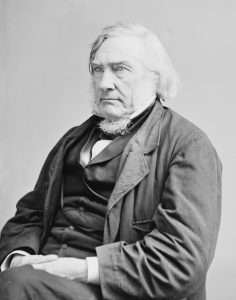The Volokh Conspiracy
Mostly law professors | Sometimes contrarian | Often libertarian | Always independent
Today in Supreme Court History: February 14, 1845
2/14/1845: Justice Samuel Nelson takes judicial oath.

Editor's Note: We invite comments and request that they be civil and on-topic. We do not moderate or assume any responsibility for comments, which are owned by the readers who post them. Comments do not represent the views of Reason.com or Reason Foundation. We reserve the right to delete any comment for any reason at any time. Comments may only be edited within 5 minutes of posting. Report abuses.
Please to post comments


That's https://reason.com/2023/02/09/bidens-terrible-billionaire-tax
Reynolds v. Atlantic Coast Line R.R. Co., 336 U.S. 207 (decided February 14, 1949): failure to clear sugar cane plants from railbed (this was Alabama) which required brakeman to cross from caboose to seventh instead of to usual sixth car to give signal was not proximate cause of his falling to his death while crossing from sixth to seventh car
Dobson v. Comm'r of Internal Revenue, 321 U.S. 231 (decided February 14, 1944): "not every gain growing out of a transaction concerning capital assets is allowed the benefits of the capital gains tax provision". The Court is (or was) aware that people who live off of buying and selling stocks pay a lower tax rate than those of us who work for a living, and tends to construe capital gains narrowly. Here, income was from settlement of a dispute over a stock sale, not from sale of stock itself.
Maty v. Grasselli Chemical Co., 303 U.S. 197 (decided February 14, 1938): applying state law (New Jersey) as to statute of limitations in a diversity action, holds that allegations of another job under same employer wherein was exposed to chemicals are not time-barred even though added after statute has run
Hollingsworth v. Virginia, 3 U.S. 378 (decided February 14, 1798): Eleventh Amendment was valid despite not having been formally presented to the President (obvious to us now, but this was the first time the amendment process was used) and was retroactive (plaintiff, seeking repayment from Virginia, had handed off to an out-of-state plaintiff because Chisholm v. Georgia had made it clear that a state could be sued in federal court by an out-of-state individual but not by an in-state) (Chisholm, of course, had then been abrogated by the Eleventh Amendment)
South Carolina State Highway Dept. v. Barnwell Bros., 303 U.S. 177 (decided February 14, 1938): state restriction on weight of trucks (20,000 lbs.) and width (90 inches) does not unfairly burden interstate commerce, and Congress has not preempted the field
In modern times the courts, to avoid invalidating the 16th Amendment, have said that the procedural formalities of amendments are a political question. Some official had been delegated the job of receiving ratification documents for the 16th Amendment. That official said they looked legit even though some legislatures had not repeated the exact text approved by Congress. The courts would accept that determination. These decisions do call into question the practice of looking closely at commas and semicolons to discern original intent. Punctuation marks can easily mutate as a bill is copied by hand and reset into type.
In modern times computers usually keep the text precisely correct as a bill moves around. But see the Deficit Reduction Act of 2005, where a handwritten amendment was allegedly not properly recorded.
In the Interstate era, even absent explicit Congressional action, state laws were struck down that required a particular type of mud flap on heavy trucks and regulated triple trailers inconsistently with other states.
The IRS case calls to mind the practice of allocating money in settlements to reduce the recipient's tax liability. As a hypothetical tortfeasor paying out of pocket it doesn't matter to me if I pay a million dollars for your stubbed toe and one dollar for punitive damages, or the reverse. It makes a huge difference to your tax bill.
Thanks! I didn't know that about the 16A.
The mud flaps case was Bibb v. Navajo Freight Lines, 1959, which I commented on here on May 25 of last year. Thanks for reminding me.
You can't call yourself a true tax protester until you know all the reasons why the income tax is illegitimate.
I’m not a tax protester. I’ve met people who refuse to pay taxes based on some of the things our government does (in particular our obscenely large military industrial complex, to quote Eisenhower), and I admire such people, but one’s tax bill can’t be so apportioned.
But I do respect your knowledge and would like to know more about objections to the 16A and in particular how they have been expressed. To my knowledge nobody has mounted a serious and well thought out opposition, but I could be wrong.